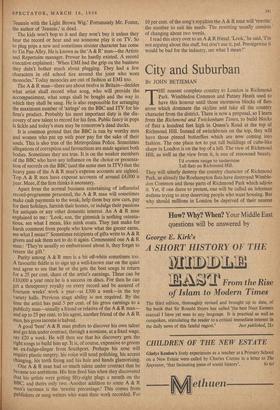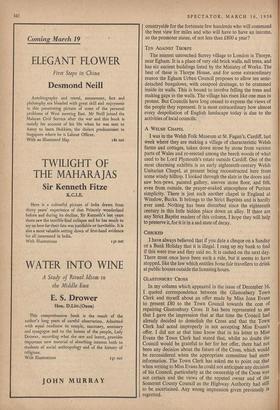City and Suburban
BY JOHN BETJEMAN THE nearest complete country to London is Richmond l'ark. Wimbledon Common and Putney Heath used to have this honour until those enormous blocks of flats arose which dominate the skyline and take all the country character from the district. There is now a proposal, so I learn from the Richmond and Twickenham Times, to build blocks of flats a hundred feet high in Queen's Road at the top of Richmond Hill. Instead of switchboxes on the top, they will have those pinned butterflies which are now coming into fashion. The one place not to put tall buildings of cube-like shape in London is on the top of a hill. The view of Richmond Hill, as well as the view from it, is one of renowned beauty.
I'd crowns resign to undermine • Tall flats on Richmond Hill.
They will utterly destroy the country character of Richmond Park. as already the Roehampton flats have destroyed Wimble- don Common and those parts of Richmond Park which adjoin it. Yet, if one dares to protest, one will be called an inhuman msthete trying to stop deserving people who want housing. But why should millions in London be deprived of their nearest countryside for the fortunate few hundreds who will command the best view for miles and who will have to have an income, so the promoter states, of not less than £800 a year?
TEN AGAINST THORPE
The nearest untouched Surrey village to London is Thorpe, near Egham. It is a place of very old brick walls, tall trees, and has six ancient buildings listed by the Ministry, of Works. The best of these is Thorpe House, and for some extraordinary reason the Egham Urban Council proposes to allow ten semi- detached bungalows, with cesspool drainage, to be crammed inside its walls. This is bound to involve felling the trees and making gaps in the walls. The village has risen like one man in protest. But Councils have long ceased to express the views of the people they represent. It is most extraordinary how almost every despoliation of English landscape today is due to the activities of local councils.
A WELSH CHAPEL I was in the Welsh Folk Museum at St. Fagan's, Cardiff, last week where they are making a village of characteristic Welsh farms and cottages, taken down stone by stone from various parts of Wales and re-erected among the beech woods of what used to be Lord Plymouth's estate outside Cardiff. One of the most charming exhibits is an early eighteenth-century Welsh Unitarian Chapel, at present being reconstructed here from some windy hilltop. I looked through the slats in the doors and saw box-pews, painted gallery, uneven stone floor, and felt, even from outside, the prayer-soaked atmosphere of Puritan simplicity. There is just such another chapel in England at Winslow, Bucks. It belongs to the Strict Baptists and is hardly ever used. Nothing has been disturbed since the eighteenth century in this little hidden place down an alley. If there are any Strict Baptist readers of this column, I hope they will help to preserve it, for it is in a sad state of decay.
CHECKED
I have always believed that if you date a cheque on a Sunday or a Bank Holiday that it is illegal. I rang up my bank to find if this were true and they said no. It is cashed on the next day. There must once have been such a rule, but it seems to have stopped, like the law which entitles bona fide travellers to drink at public houses outside the licensing hours.
GLASTONBURY CROSS
In my column which appeared in the issue of December 16, I quoted correspondence between the Glastonbury Town Clerk and myself about an offer made by Miss Joan Evans to present £80 to the Town Council towards the cost of repairing Glastonbury Cross. It has been represented to me that I gave the impression that at that time the Council had already decided to demolish the Cross and that the Town Clerk had acted improperly in not accepting Miss Evans's offer. I did not at that time know that in his letter to Miss Evans the Town Clerk had stated that, whilst no doubt the Council would be grateful to her for her offer, there had not been any decision about the future of the Cross, which would be reconsidered when the appropriate committee had more information. The Town Clerk has asked me to point out that when writing to Miss Evans he could not anticipate any decision of his Council, particularly as the ownership of the Cross was not certain and the views of the reputed owner and of the Somerset County Council as the Highway Authority had still to be ascertained. Any wrong impression given previously is regretted.



































 Previous page
Previous page